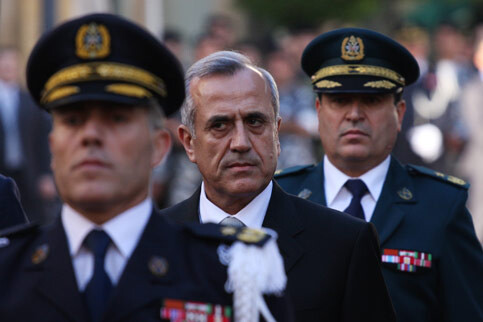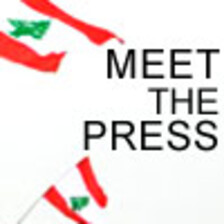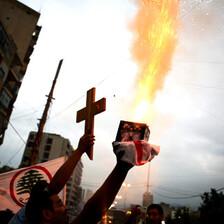Electronic Lebanon 26 May 2008

New Lebanese President Michel Suleiman enters the Lebanese parliament, 25 May 2008. (Matthew Cassel)
The Lebanese are deal-struck: in one day, their parliamentarians were to ratify decisions agreed upon in Doha, Qatar that will lead to the installment of a new president, the formation of a national partnership government, and the holding of parliamentary elections in one year’s time under a resurrected electoral law of the 1960s with some amendments. The speed and suddenness of the deal were a direct consequence of the change in the balance of power on the ground in the wake of the Hizballah military operation that exposed the weakness of the loyalist camp. While many issued a big sigh of relief that a return to Lebanon’s recent warring history had been averted, at least in the short run, big questions of the full implications of the Doha accord remain a subject of analysis and speculation in the press. The Doha settlement addressed little of the core issues at the heart of the conflict, namely the fate of Hizballah’s arms and the future policy of the country vis-a-vis the larger conflict in the Middle East between the pro- and anti-US camps.
Instead, the accord was primarily yet another readjustment of the sectarian balance of power that takes place periodically in the country to accommodate the changing political strengths of the different sects, which is only possible under international consent (the fact that this Sunday’s “election” of the new president turned into an internationally-attended ceremony is testimony to that).
As such, the Doha accord was a welcome and much needed truce to avoid total disaster, but fell extremely short of a positive long term step to tackle the core problems that could easily resurface under unexpected security developments.
So how did such a settlement come about given the regional and local factors? And who are the winners and the losers?
Nicolas Nassif of Al Akhbar accounts for the success of the talks despite the absence of direct Syrian and Saudi involvement. Sulieman Takkiyyedeen rationalizes the apparent need for such a settlement and cautions against its depiction as a true resolution of the issues. Finally, Hiyam Kossayfi of An-Nahar lays out the extent to which the new electoral law “empowers” the Christian vote.
Al Akhbar, Nicolas Nassif, 23 May 2008, “The Doha Accord under the Saudi and Syrian thresholds: Does not broach the Taif or the weapons”:
According to insiders privy to the Qatari mediation, a settlement was reached without overstepping two thresholds beyond which no resolution of the crisis could have been acceptable: A Saudi one that demanded an agreement in accordance with the Taif Accord and protects the constitutional powers [namely of the prime minister] that the accord refers to … and a Syrian threshold that insisted on excluding an attempt to undermine Hizballah’s arms. And the Doha accord respected those two stipulations. The Qatari mediation was the alternative to a Saudi-Syrian and American-Syrian dialogue whose time has not come yet. And at the same time, the Qatari initiative precipitated a minimum level of balance between the influence of Riyadh and Damascus in Lebanon after both became biased parties in the internal conflict … In this context, Damascus and Riyadh were able to justify their welcoming of a Lebanese agreement that they for the first time did not directly participate in formulating, contrary to their roles in negotiations in Geneva and Luzanne in 1983 and 1984 and later during the Taif Accord of 1989.
As-Safir, Suleiman Takkiyyedeen, 24 May 2008, “Building on the settlement: Horizons of solutions”:
The Lebanese sighed in relief and were happy with this deal because their priority lately has become security … The crisis expanded beyond a sense of anxiety and economic stagnation and social pressures into sectarian tension in the street as well a degrading and decadent political rhetoric that lost any sense of direction. But the [Doha] settlement did not touch upon the root of the problems that crystallized in the wake of the American encroachment into the region and the attempt to silence those opposed to it. For after four years laden with wounds and pain, from the string of assassinations to the Israeli war, the US push [in Lebanon] came to a halt and hid behind a paralyzed impotent government besieged by a large number of popular political grievances. This government contributed to draining the country economically and politically and security-wise due to its reliance on this foreign support. This government was careless to the point of clashing with the opposition and the resistance in what became an impossible scenario. The government’s decision [to outlaw Hizballah’s communication network and replace airport security chief] caused a big schism vis-a-vis a major Lebanese faction.The Doha conference re-patched the trust that had collapsed among different Lebanese groups. It also produced consensus over the revitalization of constitutional institutions and drew constraints to reconstitute power through an electoral law whose function is to re-establish political balance of power without carrying with it any signs of reform. It may even be the case that this law constituted a large step back from the foundations of the Taif Accord. What the opposition forces got was a correction of the chronic imbalance in representation of Christians that had been largely subordinated to the mandate of the Muslim sects. But this correction does not change the nature of the system of governance that now is made up of four or five sectarian blocks situated around leaders who monopolize the representation of certain groups and regions … We are faced with yet another attempt to save the sectarian system whose success even in the short run seems impossible once the main national issues that requires a national and social contract return to the fore. But the long truce that this agreement aims at … is an opportunity for the Lebanese to free themselves from the tutelage of these political elites that are incapable of building the state as a first and last resort for their security and for the management of their lives and the protection of their rights.
An-Nahar, Hiyam Kossayfi, 22 May 2008, “Preliminary Reading to the 2008 edition of the Electoral Law: No Exceptional Expectations of the Christians’ dreams”:
The achievement in Qatar cannot be adequately analyzed without looking at the electoral law that was agreed upon which is an amended version of the 1960 one. The need for such a scrutiny of the law becomes all the more relevant after it had been depicted as the “fat cat” that will reinstate the rights of Christians that were lost since the signing of the Taif Accord.[According to a study prepared for An-Nahar, we can conclude the following]: First, this new law agreed on in Qatar does not provide the Christians with the same gains that would have been achieved had the law been passed in its original form of 1960 and had the electoral districts set up in Beirut been the ones adopted in the era of [former 1960s president Fouad Shehab].
Second, in contrast to the Shi’ite and Sunni blocks whose voting choices are known in advance, 28 seats reserved for Christians will be chosen by purely Christian constituencies, while out of the remaining ones [64 in total], 15 will be swayed by Muslim votes and 21 will be determined by Christians only if they strike alliances with Muslim voters.
Third, the demand of the majority to split the district of Hasbayya and Marjiyoun [in the south] to isolate the Sunni and Druze seats from the Shi’ite vote was not met. In return however, the Future Movement succeeded in retaining the lion’s share in terms of seats in Beirut via the new division of the electoral districts in the city.
Meet the Lebanese Press is The Electronic Intifada’s regular review of what is making the rounds in the Lebanese press and the pundits’ take on it.
Hicham Safieddine is a Lebanese Canadian journalist.





